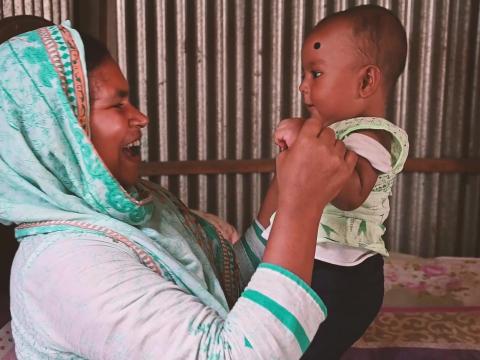Breaking harmful breastfeeding and childcare practices in rural Bangladesh

Rina Begum, 32, a mother of three children, is now more confident about raising her children properly. Participating in the community programmes offered by World Vision’s Bangladesh Initiative to Enhance Nutrition Security and Governance (BIENGS) project, she learned about proper care for both women and children during pregnancy and after the child is born, and available health care facilities in the community clinic.
The European Union-funded nutrition project is helping to improve the maternal and child nutrition of Rina and 50,732 other pregnant and lactating women and 93,087 children under 5 in rural parts of Bangladesh.
“My older children suffered from diseases. I did not know the reason then,” Rina says. Her older children were weak and thin and frequently ill. Sadly, Rina’s second child died of jaundice at just 15 days old.
According to the 2017–2018 Bangladesh Demographic and Health Survey, 45 children out of every 1,000 die before reaching the age of 5 and 35 children out of 100 are not exclusively breastfed, which is crucial for a child’s survival and helps develop a strong immune system.
Nasima Khatun, a community nutrition promoter, saw these realities when she visited families in the rural villages two years ago. She talked with a number of pregnant women and learned that many of them did heavy work while they were pregnant. Many of them also recounted traditionally-held beliefs about eating during pregnancy.
“Pregnant women used to do heavy work. Mothers-in-law advised pregnant women to eat less so that the upcoming child becomes smaller, otherwise the child will grow bigger. Pregnant mothers were provided less food,” Nasima says.
It didn’t end there. There were also many harmful cultural beliefs regarding newborn care.
“After birth, the child was not given the colostrum (first milk). Mothers-in-law forbid it. Rather than breastmilk, the child was fed honey or sugar, thinking that their voice will be sweet. They were given an amulet (Tabiz), believing the object will keep the child protected. But colostrum was not given,” Nasima explains.
Over time, Nasima discussed these issues with women, their mothers-in-law and their husbands in order to break the traditional practices that were very harmful for both mother and child. A child should be breastfed (colostrum) within one hour after birth to help to develop the brain, boost the immune system and stay healthy.
After much hard work over the past few years, Nasima can see changes among the mothers and family members. Pregnant women now avoid heavy chores and are eating enough nutritious food. Healthy babies are being born with normal weights in the villages where she works.
Rina is one of the champions.
“No other food was given to my youngest child, but I fed him only breastmilk till 6 months. Now, he is 7 months. Alongside breastfeeding, I am feeding my child additional homemade nutritious food (khichuri) I learned [to prepare] from the programme. My child is healthy. He has no diseases,” Rina states. With Nasima’s support, she has overcome the harmful traditional practices surrounding breastfeeding and child care in her community and is now raising healthy children.